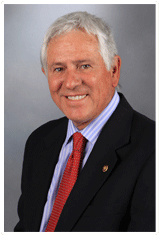JEFFERSON CITY — Last week, the deadline came and went for the governor to act on bills passed during the legislative session. In contrast to his previous four sessions, the governor set a personal best this year, vetoing 29 of 145 non-budget bills – or 20 percent of the bills the General Assembly passed. Clearly, the governor feels more politically liberated now that he is no longer accountable to the voters, and with higher political aspirations, he can now more freely express his true political beliefs with his veto pen. Unfortunately, this political maneuvering and gamesmanship will have very serious consequences for the people of Missouri and the 29th District.
The Missourians I have heard from do not believe they are undertaxed. In fact, most feel they are overtaxed, especially by the federal government. In this time of government taxing any and every possible income source, families are having a harder time making ends meet, businesses cannot hire new employees, and our economy remains sluggish. The General Assembly took a different approach this year in believing that people can spend their own money better than the government can. We passed the biggest tax overhaul the state has seen since 1921. House Bill 253 is an across-the-board tax cut for all Missouri families and businesses beginning in 2014. To guarantee that core state services like education will not be affected, there is a provision in the bill that requires a $100 million increase in revenue before the tax cuts take effect. The governor did not share our interest in cutting taxes for Missouri workers and businesses and vetoed the bill – even going so far as to withhold funding for our schools, universities, and drug task forces to block the tax cut. It’s unfortunate he would go to such lengths as putting the education of our children in jeopardy to win political points.
The governor also vetoed House Bill 436, also known as the Second Amendment Preservation Act. An energetic attack on our Second Amendment rights is taking place in different parts of the country right now, especially in Washington, D.C. To protect this basic constitutional right, an equally energetic response is needed. This is why the General Assembly passed this important bill. Missouri citizens have every right to express their opposition to attacks on their Second Amendment rights, and House Bill 436 is a clear statement to the federal government that we are adamantly opposed to any federal action to restrict our right to bear arms.
During session, I added language to Senate Bill 9 creating a new penalty for cattle theft. Many of us in southwest Missouri know all too well the problem of cattle rustling. After meeting with cattle farmers and agriculture leaders in the 29th District, I immediately drafted language raising the penalty for stealing cattle from a Class C felony to a Class B felony, which carries a sentence of no less than five years and up to 15 years in prison. Under current law, the consequences for stealing cattle are as low as one year in prison. With the possibility of such a short prison term, many cattle rustlers can afford to take the risk. On the other hand, if cattle rustlers are looking at 15 years in prison, they might think twice before cutting a fence or backing a trailer up to a gate. Passing with bipartisan support in the Senate (33-0) and the House (133-21), I was confident the governor would quickly sign Senate Bill 9 into law. You can imagine my surprise then when I learned he had vetoed it on July 2. This part of a pattern that the governor has displayed in the Capitol for quite some time. Legislators have tried to engage his office on their bills and work toward a solution, butmore often than not, are ignored only to have the legislation vetoed later on. While he cited other provisions of Senate Bill 9 as the reason for his veto, I can’t help but think the governor doesn’t take the problem of cattle theft seriously. If he did, he would have worked with us when the legislature was crafting the bill.
The governor also vetoed my Senate Bill 129, the Volunteer Health Services Act. This bill would have allowed a health care professionalto provide volunteer care with no compensation for a sponsoring organization with legal protection from frivolous lawsuits or civil damages. Unfortunately, the governor disagreed and, instead, will allow trial attorneys and litigators to continue suing doctors who are providing free medical care for their neighbors and acting in the best interest of their patients. With access to care still a problem in Missouri, this would have encouraged healthcare professionals to help their fellow citizens, without the interference of government and without putting the bill to the taxpayers.
With a supermajority in the Senate and a bare supermajority in the House, it will require nearly every majority vote or the votes of a few minority members at the annual veto session in September to override these vetoes. I am confident some will be overridden while others may not. As I make the difficult decision to vote on these 29 vetoes, I would appreciate your input. Your involvement is a vital part of the legislative process. Please feel free to comment on one of the bills I mentioned above or any of the other vetoes which can be view at www.gov.mo.gov/actions.
As always, I welcome your ideas, questions and concerns about Missouri government. You may contact me at the State Capitol as follows: (573) 751-1480; david.sater@senate.mo.gov; or by writing to Sen. David Sater, Missouri State Capitol, Room 433, Jefferson City, MO 65101. |



